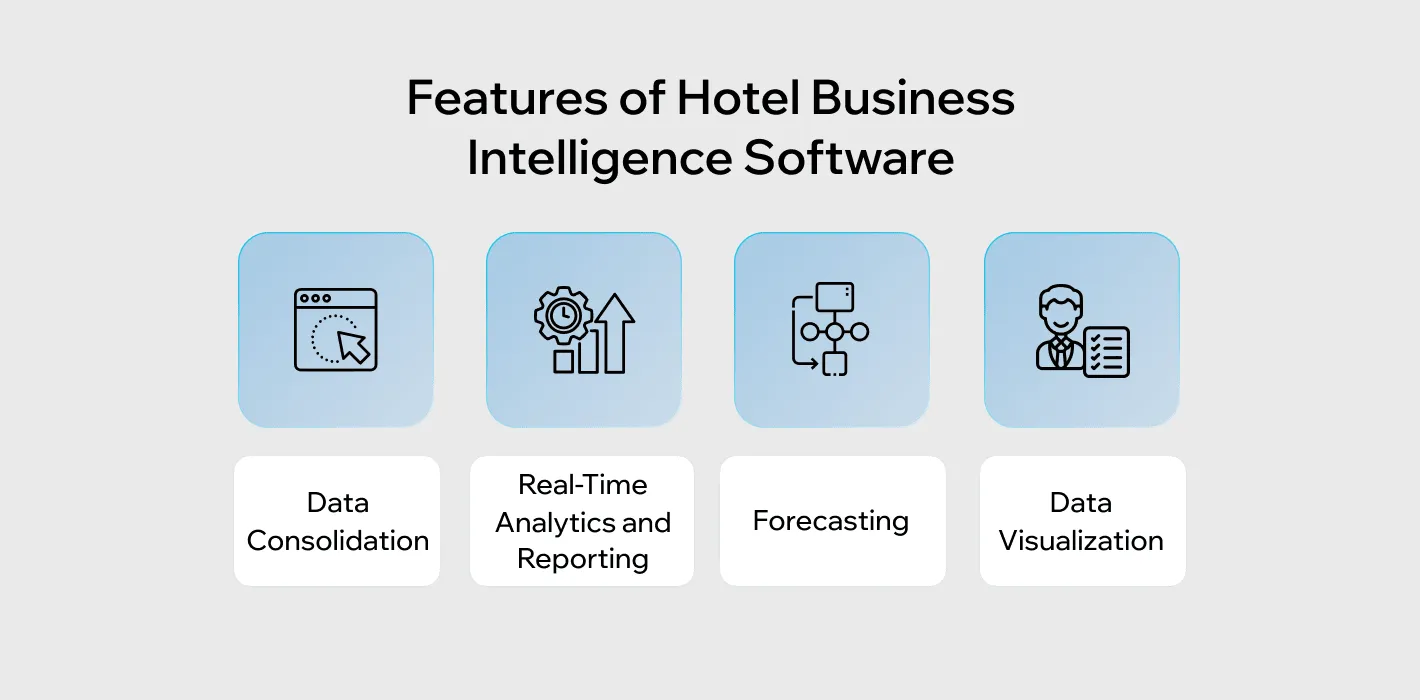

With the right analytical tools, you can make informed decisions that result in guest satisfaction. And what’s the solution you need to do this? A hotel business intelligence software (BI).
Say goodbye to traditional analysis methods that mostly overwhelm and produce low efficiency. No more need to second-guess and waste valuable resources!
The next step to improve your hospitality business is implementing a hotel business intelligence software. Read on to learn how.
 Hotel business intelligence software collects the data, analysis, and interpretation from various business sources. It integrates information from booking engines, property management systems, revenue management tools, and guest reviews. Combining everything, it provides a full view of hotel performance.
Hotel business intelligence software collects the data, analysis, and interpretation from various business sources. It integrates information from booking engines, property management systems, revenue management tools, and guest reviews. Combining everything, it provides a full view of hotel performance.
With business intelligence software, you can monitor key performance indicators (KPIs) such as occupancy rates, average daily rate (ADR), and revenue per available room (RevPAR) through visualized data in dashboards and reports.
Simply put, business intelligence software transforms raw data into actionable intelligence. With it, you can make changes that skyrocket your profits and earn guest loyalty.
Every decision based on BI, from operational improvements to marketing strategies and pricing policies, will lead to significant growth.
When choosing hotel business intelligence software, there are several key features to consider. Here’s what to look out for:

Data consolidation is the backbone of any effective hotel BI system. This software collects information from booking engines, property management systems, point-of-sale systems, and customer relationship management tools into a single platform.
This means you won’t have to jump between multiple systems to get a complete picture of your hotel’s operations—everything you need is right in front of you.
With hotel business intelligence tools, you can easily track important performance indicators like occupancy rates, revenue per available room (RevPAR), and average daily rates (ADR).
Instant access to this data allows you to spot trends and adjust your strategies. Using customizable dashboards and automated reporting, you can monitor key performance indicators (KPIs) and form quick, data-driven decisions.
By combining historical data with current market trends, hotel business intelligence software helps you forecast future demand, optimize pricing strategies, and adjust marketing campaigns.
This feature races profitability and allows for dynamic rate adjustments. Thanks to these, you can execute proactive planning for peak periods, which is crucial for effective revenue management.
Finally, hotel business intelligence systems come equipped with data visualization tools that transform raw data into easy-to-understand graphs, tables, and charts. The insights gained through data analysis empower you to make informed decisions quickly, ultimately enhancing operational efficiency and guest satisfaction.
 Implementing business intelligence tools in hotels has benefits that can significantly optimize operations and inform decision-making. Let’s dive into some of these advantages.
Implementing business intelligence tools in hotels has benefits that can significantly optimize operations and inform decision-making. Let’s dive into some of these advantages.
With data integration across multiple platforms, hotel data intelligence tools give you a comprehensive view of your hotel's operations, leading to better decision-making.
Instead of relying solely on gut feelings or limited information, you can access real-time insights that help refine your marketing strategies, optimize room pricing, and manage operational costs more effectively.
Business intelligence software automates data collection and processing, saving you time and reducing the need for manual report generation.
This allows your staff to focus on strategic tasks, ensuring that decisions are based on accurate and up-to-date information. Plus, hospitality business intelligence tools help identify inefficiency in housekeeping, staffing, and guest services, streamlining processes and boosting productivity.
With forecasting and predictive analytics, you can plan and adjust pricing strategies to maximize revenue through inventory optimization.
By analyzing booking trends and guest behavior, business intelligence solutions help uncover opportunities for upselling and cross-selling, targeting specific customer segments. This leads to increased occupancy rates, higher guest satisfaction, and greater profitability.
Closely analyzing guests' behavior, ratings, and feedback helps you tailor services that meet visitors' preferences and expectations.
Targeted marketing strategies, frequent service adjustments, and personalized offerings contribute to a better overall experience.
Choosing the right hospitality business intelligence (BI) system requires evaluating your hotel's needs and goals.
Decide what you want to improve—whether it’s operational efficiency, guest satisfaction, or revenue optimization.
If maximizing revenue is your priority, look for BI tools that offer robust analytics, demand forecasting, and performance tracking.
Choose a BI solution that integrates easily with your current systems, like POS, booking platforms, and PMS, to avoid manual data entry and reduce errors.
Look for software with intuitive dashboards, clear visualizations, and customizable reports to ensure ease of use for your team.
Select software that can grow with your hotel and support expanding data needs, additional users, or new properties as your business grows.
Make sure the provider offers reliable customer support and onboarding assistance to help your staff get the most out of the software.
Here are the seven best hospitality business intelligence software options.
Revinate is a California-based company that offers hotel solutions specifically for the hospitality industry. Their products and services satisfy the needs of the hotel industry, therefore helping lodging businesses to boost direct income and enhance guest experiences.
OTA Insights’ array of income management solutions helps hoteliers and revenue managers to make the best daily decisions about revenue and distribution. OTA Insight offers revenue managers and hotels whole, real-time, aesthetically pleasing datasets to support decision-making, after years of constant improvement and development.
Operating in the hotel industry, Duetto focuses on cloud-based revenue management tools.
The company offers services, including forecasting tools, analytics, automation, and dynamic pricing software, which helps maximize hotel demand and prices. Founded in 2012, its headquarters are located in San Francisco, California.
Inclusive software company Zoku has operations in Washington DC and Singapore. Zoku offers a single platform for trade in the retail, e-commerce, wholesale distribution, and food and beverage industries. The core team consists of members with experience in company development, consulting, and software.
Launched in 2004, Revpar Guru provides hotels with an alternative revenue management tool. Being one of the real-time revenue management technologies available on the market, Revpar Guru's specially developed Yield Dynamic Price Engine fits the needs of hotels in a very competitive industry.
Founded in 2012, with its headquarters in Seattle, Washington, ThinkReservations PMS is designed to boost hotel profitability and simplify operations. It’s a complete-featured property management tool. The technology offers seamless integration with well-known online travel agencies (OTAs), such as Booking.com, Expedia, and Airbnb.
Globally operating as a cloud-based technology company for the hotel sector, Cendyn uses its all-encompassing solutions to help hotels maximize profitability and create deeper relationships with guests.
Hotel business intelligence software cannot maximize its impact on operations without effective integration with other hotel technologies.
Integration with CRM tools, central reservation platforms, point-of-sale (POS) software, and property management systems (PMS) produces ideal results from business intelligence systems.
This connectivity provides a platform to examine all aspects of hotel operations with flawless data flow between systems. Linking hospitality business intelligence tools with your PMS will allow you to examine occupancy rates, visitor preferences, and booking trends.
Moreover, business intelligence systems fit your revenue control mechanisms and marketing tools. This helps you maximize hotel pricing and inventory and evaluate the success of your marketing campaigns.
Improving operational efficiency and decision-making heavily depends on using hotel business intelligence tools. Combining business intelligence solutions with other hotel technologies will help you predict business outcomes and thrive in the hospitality industry.
Hotel business intelligence involves using data tools to help hotels make smart decisions. It tracks performance, forecasts demand, analyzes guest behavior, and monitors competitors.
By providing real-time insights into market demand, pricing trends, and competitor rates, BI software allows hotels to optimize pricing strategies, adjust inventory distribution, and maximize profitability.
Manly look for real-time reporting, data visualization dashboards, integration with property management systems (PMS), automated reports, and cloud-based accessibility.
Yes! Most Hotel Business Intelligence solutions integrate with property management systems (PMS), channel managers, customer relationship management (CRM) tools, and revenue management systems (RMS), allowing them to provide complete insights from various data sources.
Yes! Business Intelligence software can benefit hotels of all sizes. Many solutions offer options suitable for small hotels.
Founder / CEO
Andranik is the CEO and Co-Founder of inoRain OTT and the Co-Founder of HotelSmarters, specializing in next-generation streaming technologies and digital transformation for the hospitality sector. He focuses on building innovative, scalable solutions for video delivery, OTT monetization, and data-driven hospitality management. His work bridges technical sophistication with practical business impact, helping organizations modernize their digital ecosystems and improve operational efficiency.